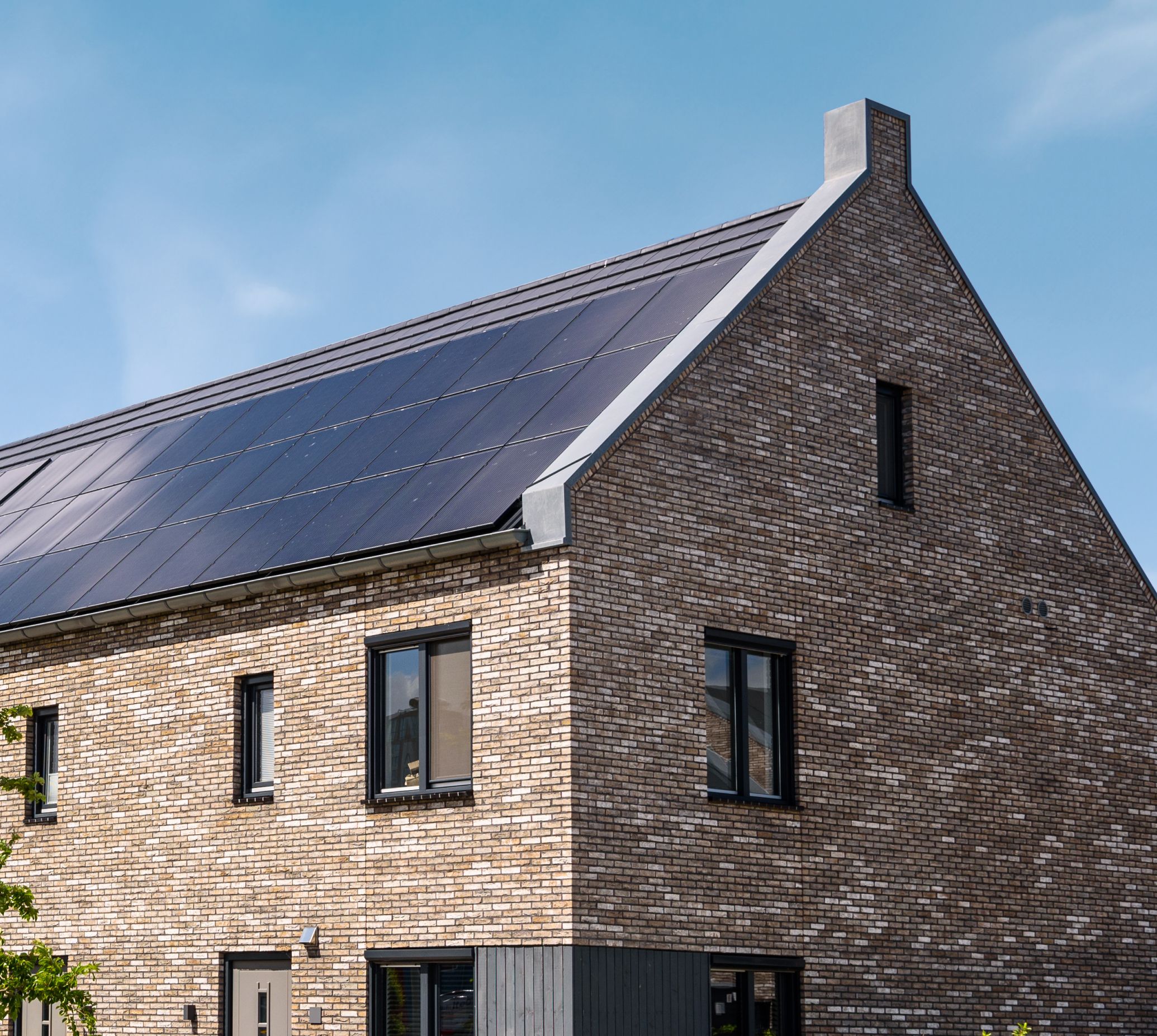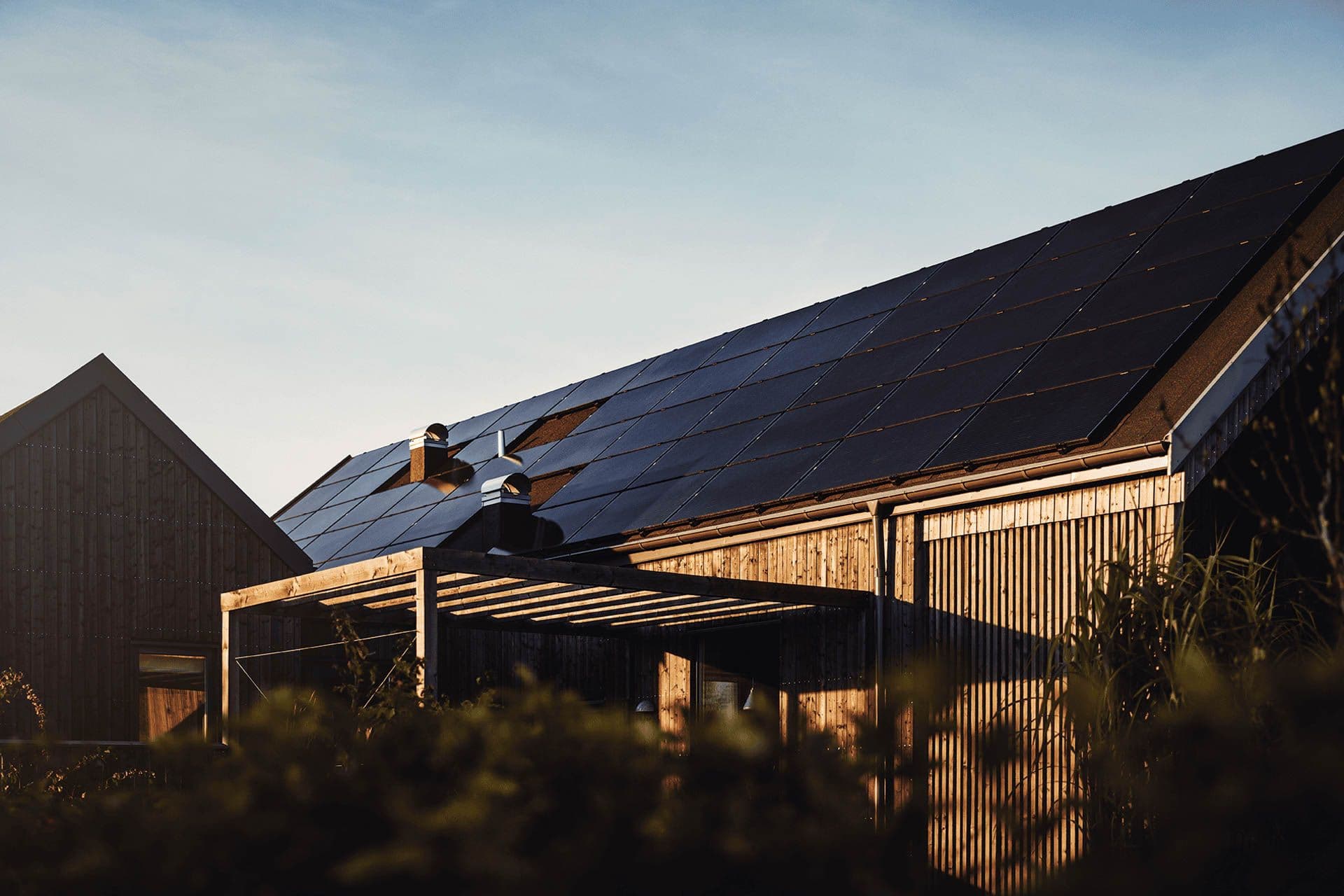29 July 2024
8 minute read
Written by:

Carl Robinson
Content Manager
The benefits of combining solar panels and heat pumps

Key takeaways
- Combining solar panels with a heat pump can save homeowners between £1,030 to £1,732 annually on energy bills.
- This combination can reduce your home's carbon emissions to zero
- Solar panels generate electricity for the heat pump, making your home more energy-efficient and less reliant on the national grid.
- With solar panels, you can sell your excess solar energy back to the grid for even more savings.
- A solar battery means you can store excess solar energy to power your heat pump overnight when the sun sets.
Imagine a home not only powered by the sun but also by air. Solar panels and heat pumps are two innovative technologies helping homeowners reduce their energy costs and carbon emissions. Before delving into this synergy, it's essential to grasp how each component functions individually.
How do solar panels work?
Harnessing the power of the sun, solar panels are ingenious devices designed to transform sunlight into usable electricity for your home. How do they achieve this feat? It's all thanks to photovoltaic (PV) cells.
PV cells are the core of a solar panel. When sunlight hits these cells, it generates an electrical current. These cells are connected within the panel and to your home's electrical system.
Solar energy collected by the panels can do more than just keep the lights on. It heats water, powers electric cars, and performs other energy-hungry tasks in your home.
How solar panels work:
- Absorption of sunlight: The solar cells absorb solar radiation.
- Creation of electrical current: The absorbed sunlight causes electrons to become excited and move, creating a direct current (DC).
- Conversion to usable power: An inverter changes this DC into alternating current (AC), powering your home.
- Distribution: Electricity is used for various needs, such as lighting and appliances.
The best part is that solar panels are adaptable, fitting different roofs and orientations. This versatility ensures that they complement a wide range of homes.

How do heat pumps work?
Depending on the type of heat pump, these clean energy-tech units pull heat from the surrounding air, ground, or water and then transfer that warmth to heat your home's water.
Heat pumps are about 400% more efficient than traditional heating systems like gas boilers. How do they manage this feat? By using a small amount of energy to transfer heat rather than generate it.
A simplified breakdown of how a heat pump works:
- Absorption: A refrigerant in the heat pump absorbs ambient thermal energy.
- Compression: The absorbed heat is then amplified by compression, increasing the temperature.
- Heat Transfer: The now-hotter refrigerant circulates through the system, releasing heat where it’s needed inside the home.
- Re-expansion: After delivering its thermal payload, the refrigerant cools down and expands, ready to absorb more heat and repeat the cycle.
Thanks to this efficient process, heat pumps not only slash energy bills by up to £500, but also reduce an average household's carbon footprint by 100% when using an Aira Clean Energy tariff.

Can you power a heat pump using solar panels?
Absolutely! Solar panels can indeed be used to power a heat pump, tapping into the clean and inexhaustible resource of the sun to generate electricity.
A solar array of around 5 kW or 26 m2 (about the area of a parking space) is generally sufficient for the average heat pump. However, bear in mind that without battery storage, your heat pump would need to use electricity from the grid when the sun goes down or on cloudy days. Properly sizing your solar system with battery storage ensures you can harness maximum energy from the sun to keep your energy savings high.
Roof space and orientation for solar panel installation
Your roof is more than just a shelter – it's potential real estate for solar energy harvesting. Ideal roofs for solar panels face south with a pitch between 30-50 degrees.
Traditional roofing materials like asphalt or composite are great when it comes to solar installations due to their durability. Metal standing seam roofs also allow for simple installation.
You can install solar panels on flat roofs, though they might need a little lift with brackets to angle the panels just right, which could lead to a slight uptick in costs.
And how many solar panels can you fit on a roof? That's a story of budget meets available space – with more square footage, you're looking at more solar panels.

How many solar panels do I need?
If you're wondering how many solar panels to buy, the numbers depend on your home and its geographic position. A typical three-bedroom home might need around 10 panels to power their home and heat pump. Our Clean Energy Expert can inform you how many solar panels you should have during our free home energy assessment.
What size inverter and battery should I get?
Selecting the appropriate size for your inverter and battery is crucial for maximising the efficiency of your solar panel system.
Inverter Sizing: The inverter converts the DC power from your solar panels into AC power for your home. It should match or slightly exceed the total wattage of your solar panels. For instance, a 5 kW system requires a 5 kW inverter, though opting for a slightly larger one, such as 5.5 kW, can ensure optimal performance.
The type of inverter matters too: string inverters suit installations with minimal shading, while microinverters are ideal for shaded areas. Hybrid inverters, combining solar and battery functions, are perfect if you plan to add battery storage.
Battery Sizing: Calculating your average daily energy usage is a simple way to size your battery. For example, if you use 20 kWh daily and want 50% coverage, you'll need a 10 kWh battery. Considering the depth of discharge (DoD) - the percentage of battery capacity that can be used before needing to recharge - is also important. For example, with an 80% DoD, you'll need a 12.5 kWh battery to get 10 kWh of usable storage.
Example: For a 5 kW solar system and 20 kWh daily usage, aim for a 12.5 kWh battery to cover 10 kWh with an 80% DoD, paired with a slightly larger inverter, like 5.5 kW, for optimal performance. To make things simple, our Clean Energy Experts will recommend your perfect setup during our free home energy assessment.

Advantages of combining solar panels and heat pumps
When you combine solar panels with an air source heat pump, you create a home heating system that's the stuff of energy-efficient dreams.
This dynamic duo transforms your home into a sustainable sanctuary. Solar panels harness sunlight to generate all the electricity needed for your heat pump, with extra energy left over for your household use.
1. Reduction in carbon footprint
Integrating solar panels with a heat pump can reduce a household's carbon emissions by an impressive 3.1 tonnes of CO₂ annually, nearly eliminating your home's carbon footprint.
2. Cost savings on energy bills
Combining a heat pump with solar panels can lead to potential savings of between £1,030 to £1,732 each year on your energy bills. These savings are made possible by the increase in energy efficiency compared to a traditional heating system.
Visit our solar panels page and try our savings calculator to discover how much a heat pump and solar panels can reduce your annual energy bills.
3. A consistent source of electricity even in winter
In the colder months, the sun might play hard to get, and solar panels might not be producing the same amount of electricity as in the summer.
However, even in the grip of winter, a well-sized solar array can supply around half of the electricity a home needs when running a heat pump. While you still may need a helping hand from the national grid to keep things toasty after sunset, integrating solar panels with battery storage can be a game-changer, storing excess energy generated during the day for use when the sun goes down.
How much would a heat pump and solar panels cost?
The upfront cost for a heat pump installation alongside solar panels can vary greatly, typically ranging from £10,000 to £35,000. This price disparity largely depends on the size and model of the system you choose to meet your electricity usage and hot water needs.
However, there's good news for those looking to make the switch. In England and Wales, the Boiler Upgrade Scheme (BUS) offers a generous reduction, cutting down the heat pump cost by £7,500.
In Scotland there’s up to £15,000 worth of funding available for those looking to make the clean energy switch via the Home Energy Scotland Grant & Loan scheme. With these discounts, investing in a heat pump with solar panels and additional battery storage is far more accessible.
It's worth noting that while the initial investment might seem steep, the benefits of lower energy costs and increased energy efficiency mean you’ll quickly see a return on your purchase. Plus, with this setup, any excess energy can be stored or even fed back into the national grid, leading to even more savings.

What savings would I get with a heat pump and solar panels?
Harnessing the power of solar energy through solar panels coupled with the smart integration of an air source heat pump can significantly dial back your annual energy bills by up to £1,732 while reducing your home’s carbon emissions.
Let's dive into the numbers to illustrate the potential savings:
Potential annual savings:
- Electricity usage: Substantial reduction in electricity needed from the national grid. Depending on the number of solar panels you have and if you have battery storage, you could reduce your electricity consumption by more than 50%.
- Energy bills: Expect to save between £1,030 and £1,732 yearly depending on the size of your home, your heat pump and how many solar panels you have.
- Carbon footprint: Reduce your home heating CO₂ emissions to zero and significantly cut your overall carbon footprint.
By combining solar panels with a heat pump, you're not only tapping into the sun's endless supply of solar power, but you're also efficiently converting that thermal energy into heating for your home. What's more, if your solar array produces excess solar energy with solar batteries, this can be stored and used when the sun goes down, enhancing your energy efficiency further.
Ultimately, the duo of solar panels and heat pumps presents an efficient solution to combat rising energy prices and contribute to a sustainable future for any UK household.
What type of house do you live in?
Keep learning
Similar articles to expand your knowledge

Published at 27 Jan 2026
Carl RobinsonThe Warm Homes Plan: what it really means for your energy bills
The UK’s new Warm Homes Plan confirms one thing: the future of cheaper energy is clean, electric homes. Here’s what the plan really means for homeowners. And how heat pumps, solar and home batteries can cut your bills long before 2030.

Published at 15 Jan 2026
Carl RobinsonIs a heat pump ideal for your semi-detached home?
Think heat pumps are only for large detached homes? In reality, semi-detached houses are perfectly suited to them. We delve into why heat pumps work so well in these homes and whether yours is ready for the swtich.

Published at 6 Jan 2026
Carl RobinsonSolar panels with home battery storage: is it worth it?
Solar panels generate free, 100% clean energy, but a home battery is what helps you use more of it. By storing excess solar power for later, battery storage can make solar far more effective. Here’s why solar and batteries belong together. And where Aira fits in.

Published at 19 Dec 2025
Carl RobinsonIs a heat pump ideal for your single-family detached home?
If you own a single-family detached home, you’re already in a strong position to switch to a heat pump. With full control over your space, insulation and energy use, heat pumps can deliver lower bills, steadier comfort and lower emissions all year round. Here’s what to know about performance, costs and everyday life with a heat pump in a single-family detached home.

Published at 17 Dec 2024
Carl RobinsonHeat pump efficiency explained: When is a heat pump most efficient and why
Heat pumps are the most efficient way to heat a UK home and are typically 4 times more efficient than a gas boiler. But what actually drives that efficiency? And when do heat pumps perform at their best? This guide breaks it down simply, from COP and SCOP to the real factors that shape performance.

Published at 2 Dec 2025
Carl RobinsonDo heat pumps work in older homes?
Thinking heat pumps are just for new builds? Think again. Many older homes can run a heat pump efficiently and affordably – cutting energy bills, reducing carbon emissions, and future-proofing your home. Just as a heat pump in a newbuild home would.